April 19, 2025 | 10:20 GMT +7
April 19, 2025 | 10:20 GMT +7
Hotline: 0913.378.918
April 19, 2025 | 10:20 GMT +7
Hotline: 0913.378.918
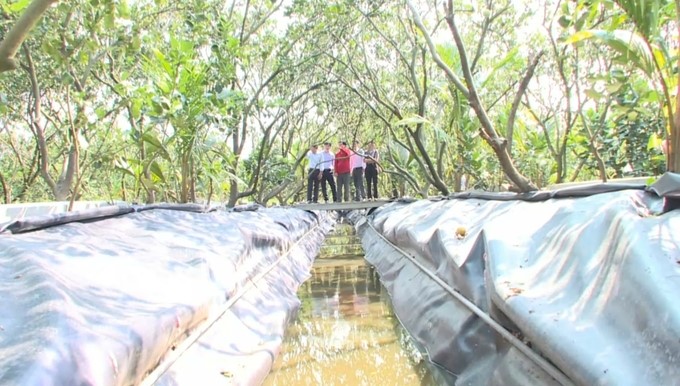
Spreading tarpaulin to store irrigation water for the pomelo garden in Tien Giang. Photo: Minh Dam.
Faced with the impact of global climate change, the Mekong Delta is facing huge challenges in water security. Notably, the land with fruit gardens, accounting for about 40% of the country with an area of about 390,000 hectares, has been facing severe water shortages and saltwater intrusion.
According to Dr. Nguyen Phu Quynh, Deputy Director of the Southern Institute of Water Resources Research (SIWRR), in order to inherit successes and overcome shortcomings in irrigation water storage solutions for fruit tree areas, the Institute was assigned by the Ministry of Agriculture and Rural Development (MARD) to preside over the implementation of the ministerial-level project "Research on distributed water storage solutions and technology to serve fruit tree areas in the Mekong Delta." The implementation period is from January 2021 to December 2024.
Initially, the research team proposed solutions for storing irrigation water and instructions for economical use of water. At the same time, transfer them to farmers through the handbook "Temporary guidance on effective water storage and irrigation techniques for fruit trees in the Mekong Delta" (published in 2021). Accordingly, there are distributed water storage solutions such as storing in ponds, dead-end canals, gardens, plastic bags, etc. Particularly, models design water storage ponds with an area of 10-15% of the garden area. Besides, the recommended economical irrigation solutions include local sprinkler irrigation and drip irrigation.

Dr. Tran Thai Hung reported research results at the Scientific Conference "Research on distributed water storage solutions and technology to serve fruit tree areas in the Mekong Delta," held in Tien Giang on August 16. Photo: Minh Dam.
Dr. Tran Thai Hung, Head of the research topic, said that the research project also inherits forecasts about water sources from the upstream of the Mekong River flowing to the Mekong Delta to advise people on the appropriate time to get water for fruit tree areas. The project has built two pilot water storage models on green-skinned pomelo (in Tien Giang) and durian (in Ben Tre). During the dry season, gardeners used water effectively, helping plants overcome drought and salinity while still ensuring high productivity.
Mr. Huynh Tan Thao, a farmer implementing the model in Tan My Chanh commune (My Tho city, Tien Giang province), shared that he received more than 70% of the funding to dig ponds and use HDPE tarpaulin to spread and store water. At the same time, he was instructed to use water economically for the 2,000 m2 pomelo garden. Mr. Thao dredged four garden ditches. Each ditch has a width of 1.8 m, a length of 100 m, and a depth of 1.2 m and stores about 4,000 m3. Pomelo trees have enough water in the dry season; the fruit falls less; and the productivity is high.
"If drought and salinity last for a long time, this amount of water will be used for 1-2 months. Because green-skinned pomelo is sensitive to salt water, only water with a salinity of 0.5‰ or less is used for irrigation, and it is necessary to stop watering if the salinity is 0.75‰ or more. During the dry season with hot sun, it is not recommended to leave too much fruit. If the tree blooms, it is necessary to pick it off and prune the branches to avoid evaporation. When the rainy season returns, the tree will quickly recover and the fruit will be beautiful," said Mr. Huynh Tan Thao.
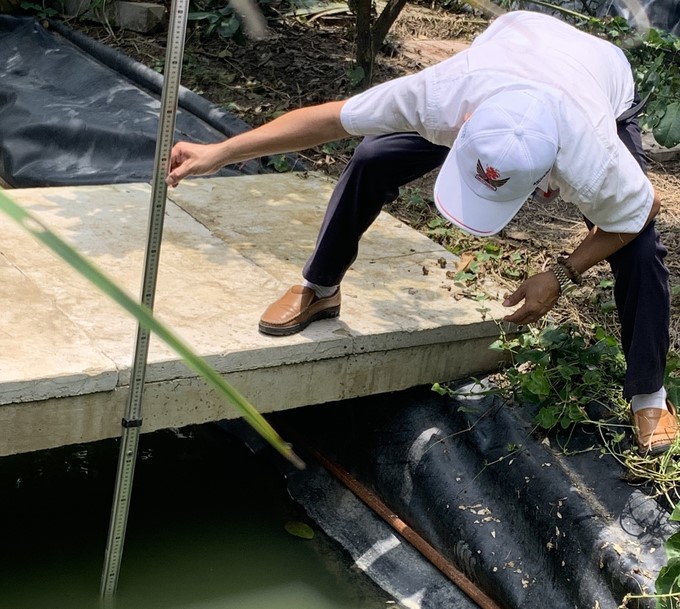
Measuring water levels in pomelo garden ditches of a pilot model in Tien Giang. Photo: Minh Dam.
For durian gardens in Ham Luong hamlet (Tan Phu commune, Chau Thanh district, Ben Tre), households have used water sources in ponds and lakes very effectively to serve irrigation during the dry season. In addition, they also share with the surrounding people a part of their irrigation water during the prolonged drought and salinity.
According to Mr. Nguyen Van Man, Director of the Tien Giang Department of Agriculture and Rural Development, the province's strength is fruits and vegetables, especially exported fruits that bring high value. On average each year, the province provides domestic and foreign markets with more than 1.7 million tons of fruits, 1.2 million tons of vegetables, and 800,000 tons of rice. However, in recent years, climate change and rising sea levels have had significant impacts on agricultural production, especially the development of fruit trees, as these crops are sensitive to water quality.
The leader of the Tien Giang agricultural sector said that SIWRR's implementation of this scientific project is very practical. Through this, contribute to promptly solving the concerns of gardeners, scientists, and managers in recent times. That is to find solutions to improve quality, lower costs, improve economic efficiency, and minimize losses for farmers, thereby meeting production needs, contributing to restructuring the agricultural sector, and adapting to climate change.
Previously, in mid-March 2024, the focus of drought and salinity in the Mekong Delta, Deputy Minister of Agriculture and Rural Development Nguyen Hoang Hiep inspected the situation of responding to drought and salinity. The decentralized (distributed) water storage solution is highly appreciated by the Deputy Minister. He affirmed that the successful response to drought and salinity is thanks to the decentralized water storage solution for both domestic and production water.
Translated by Thu Huyen
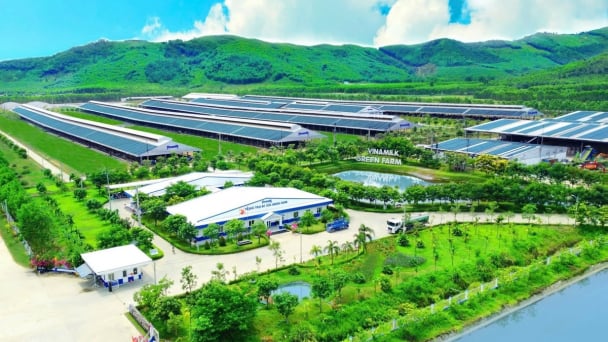
(VAN) Le Hoang Minh, representing Vinamilk, shared the company's experience in energy saving and green energy transition for production at a workshop held during the P4G Summit.
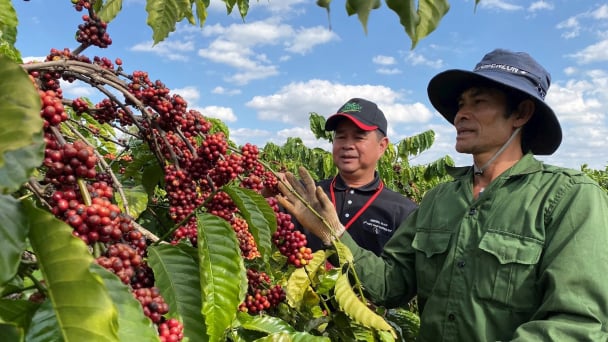
(VAN) Businesses emphasize fairness and equality when integrating social factors into their sustainable development strategies.
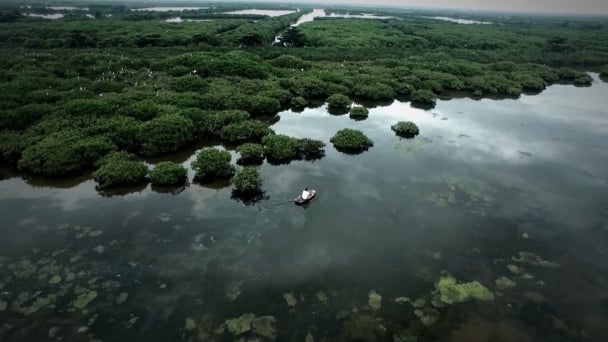
(VAN) French organizations and enterprises propose that Thai Binh province provide potential and long-term cooperation contents related to climate change response and green industrial development.
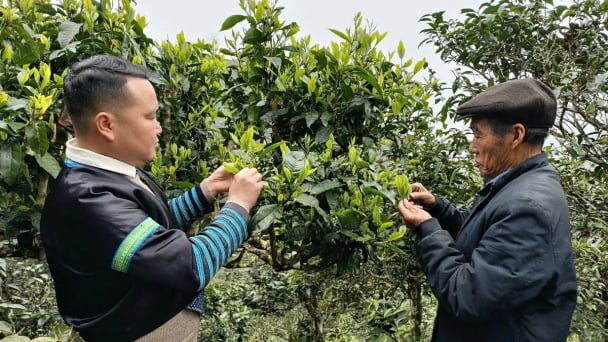
(VAN) Shan Tuyet tea is considered a 'heavenly treasure'. The H'mong people allow the tea to grow naturally, adhering to organic production principles, with the aim of exporting the product.
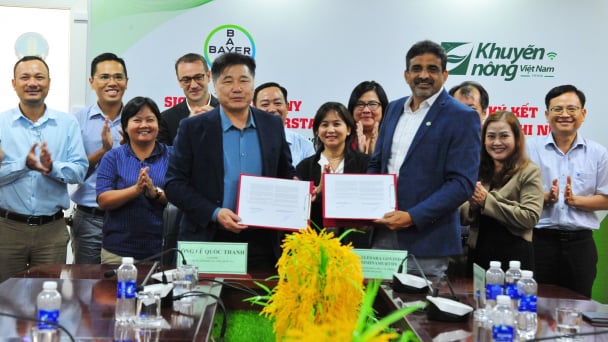
(VAN) Bayer Vietnam and the National Agricultural Extension Center have signed a partnership agreement to expand the development of effective and safe farming models for rice, durian, and coffee.
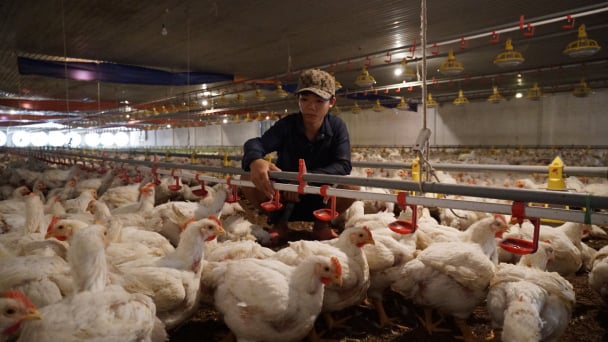
(VAN) Tay Ninh province possesses all the favorable conditions, from natural advantages to geographic location and social harmony, to drive economic development, particularly in attracting investment and advancing modern livestock farming.
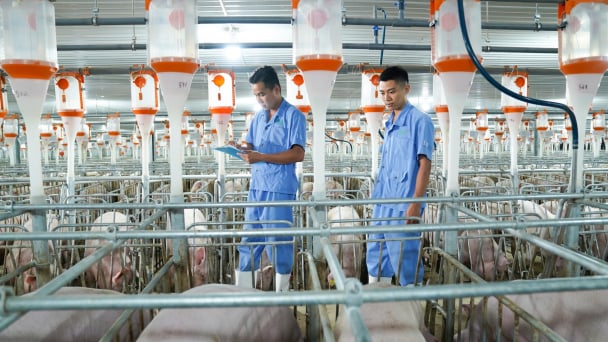
(VAN) Notably, every link in BAF's entire closed livestock value chain Feed - Farm - Food has received international certification.